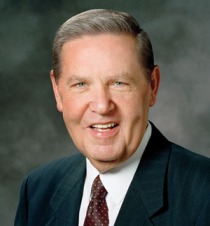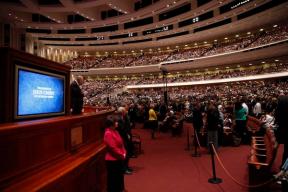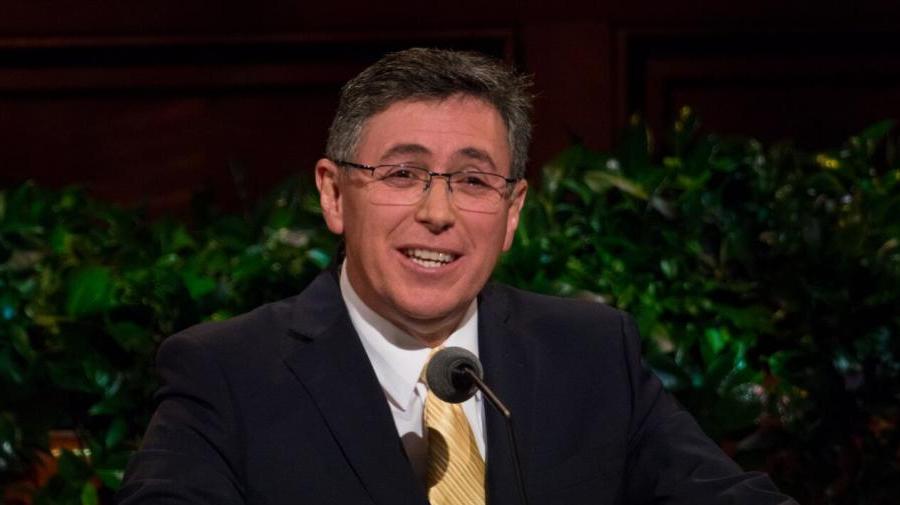
Essential Truths – Our need to Act
By Elder Adilson de Paula Parrella
It is encouraging to see clear teaching on what the LDS Church believes. It makes it much easier to search for truth when beliefs are presented accurately and clearly, for this I applaud Elder Parrella.
The First Vision and the Prophet Joseph Smith brought forth knowledge and truth that are essential to our happiness in this life and to our exaltation.
I’d like to start out by asking a simple question, which vision account are we talking about? Yes I know some will say that they are just different aspect of the same account but I’d ask you to view them chronology along side Joseph’s other written works. For example the first vision account which states it was an angel and doesn’t mention The Father and Son having bodies of flesh and bone Matches Joseph’s written work at the time: like the Book of Mormon which doesn’t mention the bodies of flesh and bone in fact it denies it, more about this below.
When I was about seven years old, I asked my mother, “When you and I die and go to heaven, will you still be my mother?” She was not expecting such a question. But answering to the best of her knowledge, she said, “No, in heaven we are going to be brothers and sisters. I will not be your mother.” That was not the answer I was hoping for.
When I first starting meeting with Mormon missionaries, two of the first Elders I met with discussed the idea of the eternal family, I found it very strange as I knew Jesus had discussed the subject with the Pharisees in Matthew 22, Jesus understanding of marriage existing after this life seemed in total opposition to what the missionaries where telling me.
“The same day Sadducees came to him, who say that there is no resurrection, and they asked him a question, saying, “Teacher, Moses said, ‘If a man dies having no children, his brother must marry the widow and raise up offspring for his brother.’ Now there were seven brothers among us. The first married and died, and having no offspring left his wife to his brother. So too the second and third, down to the seventh. After them all, the woman died. In the resurrection, therefore, of the seven, whose wife will she be? For they all had her.” But Jesus answered them, “You are wrong, because you know neither the Scriptures nor the power of God. For in the resurrection they neither marry nor are given in marriage, but are like angels in heaven. Matthew 22:23-30
Jesus would seem to hold the same view as Elder Parrella’s mother. It isn’t that there is no marriage in heaven; I believe that there is simply just one marriage in heaven, the marriage between Jesus and his bride the church, if our experience of being with Christ is our greatest joy, then why would we need that earthly inferior joy that comes form the union of husband and wife wonderful as that might be.
As I brought up during a review of last years conference, I believe C.S. Lewis explains this very well when he writes:
“The letter and spirit of scripture, and of all Christianity, forbid us to suppose that life in the New Creation will be a sexual life; and this reduces our imagination to the withering alternatives either of bodies which are hardly recognizable as human bodies at all or else of a perpetual fast. As regards the fast, I think our present outlook might be like that of a small boy who, on being told that the sexual act was the highest bodily pleasure, should immediately ask whether you ate chocolates at the same time.
On receiving the answer ‘No,’ he might regard [the] absence of chocolates as the chief characteristic of sexuality. In vain would you tell him that the reason why lovers in their raptures don’t bother about chocolates is that they have something better to think of. The boy knows chocolate: he does not know the positive thing that excludes it. We are in the same position. We know the sexual life; we do not know, except in glimpses, the other thing which, in Heaven, will leave no room for it.”
Parrella says:
Sometime after that short interaction, two young men arrived at the gate of our home. By some miracle, my father allowed them to come in. They said they were missionaries from The Church of Jesus Christ of Latter-day Saints…. They taught us that families truly can be together after this life as father, mother, and sons and daughters.
To continue the analogy of the boy wanting to eat chocolate, here we have the situation where upon hearing from his mother that chocolate doesn’t feature in intercourse, rather than accepting that answer from the parent who would know, he asks other boys if chocolate is involved until he finds one who tells him that really intercourse is all about chocolate. He then decides to believe the other boy along with anything else the other boy has to say because he likes those answers better than his parents.
Jesus clearly taught that families are a construct for this lifetime only, when we love another dearly it might be a hard truth to swallow, however I am going to trust the one who holds the future and is now in the heavens, rather than the teaching of another who claims to follow Jesus but rejects what he taught on the subject.
Lets examine the three ‘truths’ of the talk:
1, God Calls Prophets to Lead and Guide Us
An essential truth we learn from the First Vision and the Prophet Joseph Smith is that God calls prophets, seers, and revelators to instruct, guide, warn, and lead us. These men are God’s mouthpieces on earth, with the authority to speak and act in the name of the Lord. By strictly following their counsel, we will be protected and receive choice blessings in our journey on this earth.
Here I believe we have a partial truth. Does God call prophets to instruct, guide, warn and lead us? Yes, the bible is clear on this; many books in the Old Testament are written by such prophets.
In the New Testament we have verses such as Ephesians 4:11
“And he gave some, apostles; and some, prophets; and some, evangelists; and some, pastors and teachers”
2 Peter 1:20-21
“Above all, you must understand that no prophecy of Scripture came about by the prophet’s own interpretation of things. For prophecy never had its origin in the human will, but prophets, though human, spoke from God as they were carried along by the Holy Spirit.”
Revelation is an entire book filled with prophecies, a proportion of which was future for John but is history for us today.
For a fuller understanding of the prophetic role in the New testament church I’d strongly recommend you check out this link at The Gospel Coalition.
What I would like to address is does Joseph’s vision give us the essential truth that God call’s prophets?
The accepted vision account found in the Pearl of great Price today tells us that Joseph saw “two Personages, whose brightness and glory defy all description, standing above me in the air. One of them spake unto me, calling me by name and said, pointing to the other—This is My Beloved Son. Hear Him!”
John 6:46
“Not that any man hath seen the Father, save he [Jesus] which is of God, he hath seen the Father.”
Some have argued that the bible contradicts itself as some places we are told you cannot see God and live and at other time prophets such as Moses are described as having seen God face to face. I believe this is only possible to understand within the Trinitarian view of God. No-one has seen God the father at any time – Exodus 33:20, however Jesus is identified as God and people saw him. So we can see God by seeing Jesus and still live.
So if we evaluate Joseph’s vision based on whether the father can be seen then it falls short.
Another test of a prophet can be found in Deuteronomy 13:1-3
“If there arise among you a prophet, or a dreamer of dreams, and giveth thee a sign or a wonder, And the sign or the wonder come to pass, whereof he spake unto thee, saying, Let us go after other gods, which thou hast not known, and let us serve them; Thou shalt not hearken unto the words of that prophet, or that dreamer of dreams: for the Lord your God proveth you, to know whether ye love the Lord your God with all your heart and with all your soul.”
So even if a so-called prophet can performs wonderful signs – perhaps even writing a book, which seems like scripture. Even if he can tell the future as Joseph Smith claimed, if the prophet leads you after other Gods you are to reject him.
Lets continue to the next point raised by Elder Parrella to see what Joseph revealed about God.
2, The Knowledge of the True Nature of God
Here we have some truths we all agree on mixed in with teachings unique to the LDS church. Lets examine them one by one.
Another truth we learn because of the First Vision and the Prophet Joseph Smith is the true nature of God.
Firstly I find it strange that this is presented as a new truth with was only revealed by Joseph’s vision, are you telling me no one before 1830 knew the true nature of God?
Just imagine how blessed we are to know that God is a being with a body of flesh and bones as tangible as ours,
This statement is potentially very confusing, which god is being referred to? In Mormonism there isn’t just one, after all according to the King Follett Discourse, ‘God’ was once a man on another planet and married Mormon men may become gods also. However let us assume the most likely answer and go with God the father or ‘Elohim’ in LDS lingo. Does God the father have a body of flesh and bone according to the bible or indeed the book of Mormon?
Firstly as far as I’m aware this is nowhere taught in the Book of Mormon, like the bible which teaches in John 4:24 “God is spirit, and his worshipers must worship in the Spirit and in truth” the Book of Mormon also refers to God as a spirit.
Alma 18:24-28
And Ammon began to speak unto him with boldness, and said unto him: Believest thou that there is a God?And he answered, and said unto him: I do not know what that meaneth.And then Ammon said: Believest thou that there is a Great Spirit? And he said, Yea.And Ammon said: This is God. And Ammon said unto him again: Believest thou that this Great Spirit, who is God, created all things which are in heaven and in the earth?
Alma 22:9-11
And the king said: Is God that Great Spirit that brought our fathers out of the land of Jerusalem? And Aaron said unto him: Yea, he is that Great Spirit, and he created all things both in heaven and in earth. Believest thou this? And he said: Yea, I believe that the Great Spirit created all things, and I desire that ye should tell me concerning all these things, and I will believe thy words.
I would suggest that the idea of God having a body of flesh and bone was a later doctrinal development. In the first vision account of 1832 it was an angel that appeared to him, no mention of the bodies of flesh and bone. See here for more on this.
Parrella says:
“…that we can worship a God who is real, whom we can understand, and who has shown and revealed Himself and His Son to His prophets—both prophets of old and prophets in these latter days.”
Here we are in agreement it is wonderful that God the Father has revealed himself to mankind, especially through his Son.
He is a God who hears and answers our prayers; a God who watches us from heaven above and is constantly concerned about our spiritual and temporal well-being
That God would listen to each of us and be moved by our experience of the different circumstances of life is truly astonishing. When preparing for a sermon on the resurrection of Lazarus, I was struck again by how much Jesus despite seeing the bigger picture was deeply moved by the sorrow of those around him. See John 11 in particular verses 33-35.
A God who gives us agency to decide for ourselves to follow Him and obey His commandments without coercion; a God who gives us blessings and allows us to face trials so we can grow and become like Him. He is a loving God who provided a plan through which we can enjoy happiness in this life and in eternity.
Here are more points of agreement, we must choose to follow Jesus, It was out of love that he came and without him we are lost. As mentioned in part 1 of the review it was very encouraging to hear from elder Ellis how God uses the hard time for our benefit
3, Jesus Christ Is Our Savior
From the First Vision and the Prophet Joseph Smith, we received knowledge of the reality and sacred mission of the Lord Jesus Christ, who is the cornerstone of our religion.
We certainly agree about the totally necessity of Jesus, what we would disagree on is the sufficiency of the scriptures of the Old and New Testament to give us the knowledge necessary for salvation through Jesus. Paul was able to write to Timothy: “from infancy you have known the Holy Scriptures, which are able to make you wise for salvation through faith in Christ Jesus.” Therefore the scripture that was available to Timothy, without question the Old Testament and I would also argue that the writing of Paul and the other apostles were also being referred to as scripture by the early church given Peter can refer to Paul’s writings as scripture in 2 Peter 3:16. Therefore to claim Joseph needed to bring new information so we could understand Jesus role as Saviour doesn’t seem to have much credibility.
Because death was introduced into the world, as surely as we live now, we will all die one day. One of the effects of death would be the permanent loss of our physical body; we wouldn’t be able to do anything to reclaim it. In addition, because we all sin during our journey here on earth, we would never be able to return to our Heavenly Father’s presence. Can you imagine the consequences of being deprived of God’s presence and never again having a body?
A Savior and Redeemer was needed to free us from death and sin. Under Heavenly Father’s direction, Jesus Christ came to earth, suffered, died on the cross, and was resurrected so that we too can be resurrected and, with sincere repentance and the making and keeping of sacred covenants, be once again in the presence of God.
Here we can agree with all but the final sentence that the keeping of sacred covenants as defined by the LDS church is essential for salvation. For instance baptism, the thief of the cross would be with Jesus in paradise without the opportunity to be baptised. When discussing this issue with missionaries they countered that baptism for the dead could have been preformed for him. However for a fuller understanding of the context of 1 Corinthians 15:29 please see the article on CARM.
Hebrews 9:27 reminds us we die once then comes judgement and in John 9:4 Jesus reminds us we must work while it is day. The need for a second chance is alien to Jesus teaching as he taught that it was all whom the Father gives him will come to him. (John 6:37)
Jesus is the promised Messiah, the Lawgiver, the Holy One of Israel, our Lord, our Savior, our Redeemer, our King, our All. May we all continue to act upon these essential truths and knowledge, offering our obedience to God and His Beloved Son. In the name of Jesus Christ, amen.
I too pray that we would all follow the true Jesus Christ, knowing who he truly is. Not one of many gods but the one true God. May we act upon the essential truth recorded in the Old and New Testament that were inspired by the Holy Spirit. , offering our obedience to God the Father and His Beloved Son. In the name of Jesus Christ, amen.
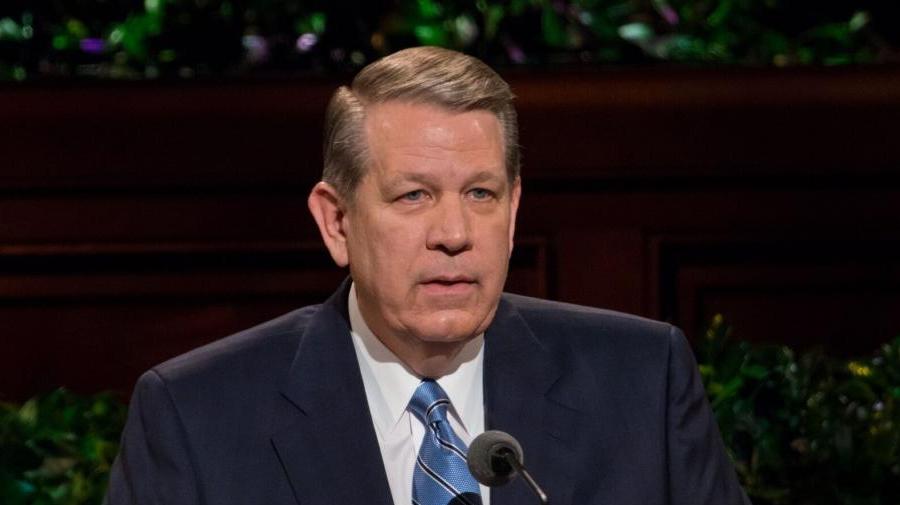

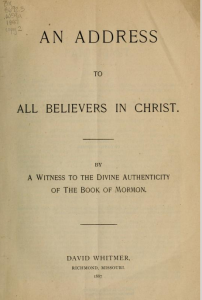


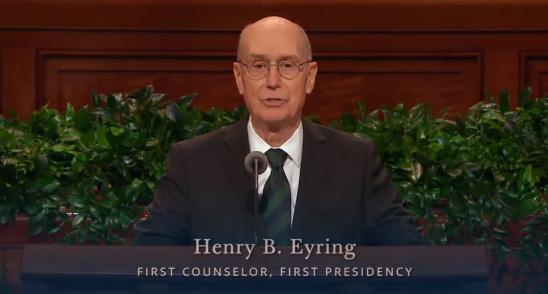
 have been helping with the relief efforts for these horrible events in Texas and others areas, this attitude of servanthood is littered throughout all the talks in this session and I can’t help but be impressed by it.
have been helping with the relief efforts for these horrible events in Texas and others areas, this attitude of servanthood is littered throughout all the talks in this session and I can’t help but be impressed by it.

